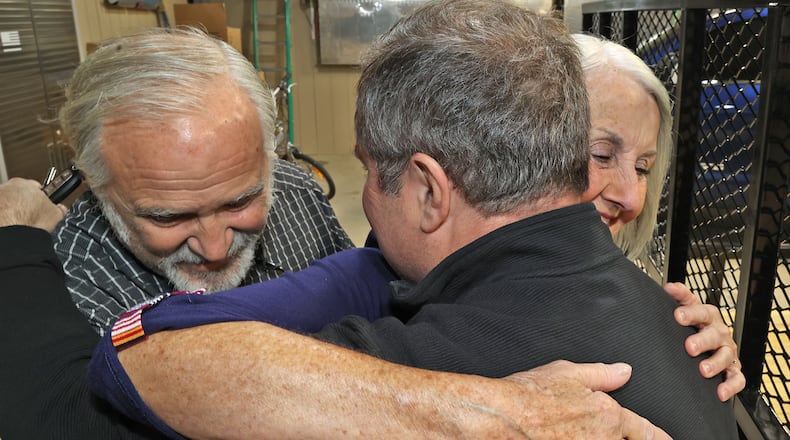“As it was touching down, I noticed the tail of the airplane start to rise and I thought, ‘That’s really unusual. He’d better control that or else he’s going to hit the propeller,’” said Driscoll, a pilot himself. “Sure enough, the propeller contacted the ground and I just saw clouds of dirt just fly in the air.”
What happened next that day — Oct. 13, 2020 — seemed to take place in slow motion, he said, as the small light sport aircraft went vertical on its nose and its engine compartment exploded. The plane then rolled over onto its back with the engine compartment erupting in flames.
“My immediate reaction was to take the pedal of my accelerator to the floor and I raced as far as I could to the aircraft,” he said.
Skidding to a stop, the 56-year-old opened the vehicle’s door and ran to the plane. Inside a cockpit darkened by grass and dirt from the runway, he spotted Joyce and Timothy Seymour, 72 and 73 respectively, disoriented and hanging upside down and unable to release themselves from their seat belts.
“(I was) feeling that I have a mission to do and to get them out before they burn alive,” Driscoll said.
Crouching on the wing, he repeatedly attempted locating the latch for Joyce Seymour’s seat belt before he eventually did so and pulled her from the wreckage.
Credit: Bill Lackey
Credit: Bill Lackey
Driscoll then dashed to the wing at the pilot’s side as the flames intensified and spread toward the cockpit.
“I’m thinking ‘This is probably not going to turn out well ... It’s debatable if the fuel tank is going to explode,’” he said.
This time, Driscoll found the seat belt latch on the first try and released Timothy, who fell to the roof of the plane. When Driscoll’s shouts to flee failed to get the dazed pilot’s attention, he dragged him from the scene by his belt just as another man, Jared Berner, arrived with a fire extinguisher.
“Within seconds of me pulling Mr. Seymour from the plane, that cockpit area was completely in flames,” said Driscoll, whose head was singed by the fire.
Shortly after the crash, the Ohio State Highway Patrol also recognized Driscoll and Berner for their “swift actions and teamwork” to help save the Seymours’ lives.
Now, Driscoll is among 18 civilians recognized by the Carnegie Hero Fund for risking their lives to save others. Each will receive the Carnegie Medal for civilian heroism.
The Carnegie Hero Fund Commission awards the Carnegie Medal to individuals from the U.S. and Canada who risk their lives to an extraordinary degree while saving or attempting to save the lives of others. With this announcement, a total of 10,291 Carnegie Medals have been awarded since the Pittsburgh-based Fund’s inception in 1904.
Commission Chair Mark Laskow said each of the awardees or their survivors will also receive a financial grant. Throughout the 118 years since the fund was established by industrialist philanthropist Andrew Carnegie, nearly $44 million has been given in one-time grants, scholarship aid, death benefits, and continuing assistance.
Driscoll said he was surprised to learn he was to receive the award.
“I was kind of taken aside a little bit because some of these people who have received this reward have received it posthumously, and that’s kind of heartbreaking,” he said. “I was just a person who was there that day that just happened to react.
“I did what I thought I was supposed to do. To me, I don’t really consider myself a hero or anything like that.”
Driscoll said he served 36 years combined in both active duty and reserves. He was an Air Force pilot who flew missions into Iraq and Afghanistan.
“I had an opportunity to see a lot of people that I really would consider heroes,” he said.
For the Seymours, who are both pilots, flying is a big part of their lives. And now, so is Driscoll.
They spoke with him during his visit to the hospital following the crash, then at the OSHP ceremony honoring him and Berner and then again over dinner with Driscoll and his wife in 2021.
Joyce said it was “perfect” how Driscoll came through for them the way he did and that they’re extremely grateful for his heroism, especially as it came as the Seymours’ son, 10-year-old grandson and 5-year-old granddaughter looked on.
“It was a miracle,” she said. “Everything was just right.”
Credit: Bill Lackey
Credit: Bill Lackey
Timothy said it’s great that Driscoll is being recognized on the national level by the Carnegie Hero Fund Commission.
“He saved our lives,” he said. “I didn’t realize when I saw that fire start that If we didn’t get out of the airplane, we were cooked. We owe our lives to him.”
NOMINATE A HERO
Do you know of someone whose lifesaving efforts deserved to recognized? Nominate them for the Carnegie Medal by completing a nomination form online at www.carnegiehero.org or by writing to the Carnegie Hero Fund Commission, 436 Seventh Ave., Suite 1101, Pittsburgh, PA 15219.
About the Author




